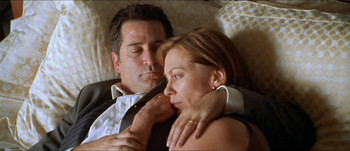Twitter Review: Star Trek: The Motion Picture
Once you get past the torpid first hour, 1979’s ‘Star Trek’ is shockingly compelling – a leisurely puzzle that presages ‘BSG’ and its themes
Once you get past the torpid first hour, 1979’s ‘Star Trek’ is shockingly compelling – a leisurely puzzle that presages ‘BSG’ and its themes
‘Up’ made me cry at least twice, but its well-supported message undercut its admittedly spectacular spectacle. That’s its point and problem.
‘Star Trek’ – Brisk, elegant, and thin, Abrams’ reboot draws its gravity from Leonard Nimoy, funny and illogically emotional. Pegg is a hoot
‘JCVD’ – Not as smart as it thinks it is, but still potent. Van Damme effectively exploits his irrelevance for laughs & pathos. Too stylized
 The conventional wisdom says that among the early entrants in the summer 2009 sweepstakes, Star Trek is a hit (and a winner in its first three weekends in our Box Office Power Rankings), Wolverine is a disappointment, and nobody cares about Angels and Demons. Yet X-Men Origins: Wolverine had the biggest North American opening of the three: $85 million. These evaluations are muddied by so many variables that it’s difficult to cut through the crap. But one simple measure is second-weekend drop-off, generally considered a reliable indicator of a movie’s staying power. So: Wolverine dropped 69.0 percent from $85 million; Star Trek dropped 42.8 percent from $75 million; and Angels and Demons dropped 53.0 percent (not counting the Monday holiday) from $46 million.
The conventional wisdom says that among the early entrants in the summer 2009 sweepstakes, Star Trek is a hit (and a winner in its first three weekends in our Box Office Power Rankings), Wolverine is a disappointment, and nobody cares about Angels and Demons. Yet X-Men Origins: Wolverine had the biggest North American opening of the three: $85 million. These evaluations are muddied by so many variables that it’s difficult to cut through the crap. But one simple measure is second-weekend drop-off, generally considered a reliable indicator of a movie’s staying power. So: Wolverine dropped 69.0 percent from $85 million; Star Trek dropped 42.8 percent from $75 million; and Angels and Demons dropped 53.0 percent (not counting the Monday holiday) from $46 million.
‘The Wrester’: Rourke lives the role beautifully, but the first-half character-study authenticity devolves into inevitable, overplayed story
‘Lost’ S5 finale: Josh Holloway proves himself the worst among many bad actors; the suspense is less “What happens next?!” than “Where now?”
 Much to my surprise, I can find no reference to the nearly universal cinematic “wedding-ring rule”: Any time a wedding ring is a prominent prop or visual motif in a movie, infidelity will be a central theme. The obverse: Any movie with infidelity as a central theme will feature the wedding ring as a prop or visual motif. I could offer dozens of examples, but the best might be Lantana, which is obviously about sexual straying but has a greater interest in marriage overall, especially the underlying, intertwined issues of trust and honesty. Although it’s nearly too blunt in its themes, the movie feels continuously right, nailing not only relationship dynamics but interred grief and pain. Throughout, it gets the tone, nuance, and scale of life correct.
Much to my surprise, I can find no reference to the nearly universal cinematic “wedding-ring rule”: Any time a wedding ring is a prominent prop or visual motif in a movie, infidelity will be a central theme. The obverse: Any movie with infidelity as a central theme will feature the wedding ring as a prop or visual motif. I could offer dozens of examples, but the best might be Lantana, which is obviously about sexual straying but has a greater interest in marriage overall, especially the underlying, intertwined issues of trust and honesty. Although it’s nearly too blunt in its themes, the movie feels continuously right, nailing not only relationship dynamics but interred grief and pain. Throughout, it gets the tone, nuance, and scale of life correct.
 Thank Gods (I’ve been watching Battlestar Galactica, although to say I’ve been enjoying it would be an overstatement) that with X-Men Origins: Wolverine, the summer movie season is finally here. Normally, I would need Entertainment Weekly to tell me this, but our subscription lapsed. So I have to rely on the Wolverine television ads, which actually claim that those muttonchops are the first sign of the season. Wolverine did well enough in its opening weekend, with $85 million domestically, but I’m afraid it might actually be an appropriate opener for summer 2009: the next installment of an established brand, and a movie that seems to excite very few people. Yes, they show up and pay their money the first weekend, but I think it’s out of habit. Call it obligation cinema.
Thank Gods (I’ve been watching Battlestar Galactica, although to say I’ve been enjoying it would be an overstatement) that with X-Men Origins: Wolverine, the summer movie season is finally here. Normally, I would need Entertainment Weekly to tell me this, but our subscription lapsed. So I have to rely on the Wolverine television ads, which actually claim that those muttonchops are the first sign of the season. Wolverine did well enough in its opening weekend, with $85 million domestically, but I’m afraid it might actually be an appropriate opener for summer 2009: the next installment of an established brand, and a movie that seems to excite very few people. Yes, they show up and pay their money the first weekend, but I think it’s out of habit. Call it obligation cinema.
 A run of sequels is supposed to die a slow death, with waning interest as a series progresses. What, then, explains the $71-million opening-weekend take of Fast and Furious? I know everybody has already forgotten the damned thing exists, but I’m still awed by that number. It’s a third sequel in a franchise nobody gets excited about, and it tops the series’ previous best start by $20 million.
A run of sequels is supposed to die a slow death, with waning interest as a series progresses. What, then, explains the $71-million opening-weekend take of Fast and Furious? I know everybody has already forgotten the damned thing exists, but I’m still awed by that number. It’s a third sequel in a franchise nobody gets excited about, and it tops the series’ previous best start by $20 million.